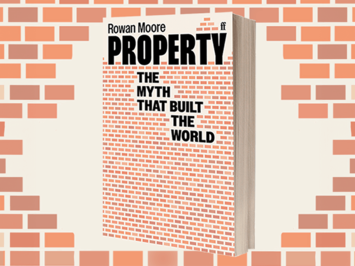
Joel Kotkin reviews the recently released book, Property: The Myth That Built the World, by Rowan Moore. The review is excerpted below:
For most of human history, from the ancient Semitic civilisations to the societies of the present, property has played a central role in exciting both achievement and destruction. In examining its role in our past and present lives, Rowan Moore’s new book offers many insights. Moore, architecture critic at The Observer, appreciates the role that property has played in advancing civilisation, as well as in many horrific episodes, from the near-extermination of native peoples to the development of chattel slavery. He does a credible job of describing how John Locke’s defence of private property drove Britain’s Industrial Revolution, as well as helping to shape both the colonisation of North America and the US Constitution, with its protection of individual property rights. He rightly catalogues the abuses of aboriginal peoples and the confiscation of their terroirs that stemmed from the growth of natural-law ideas of property.
When Moore turns to the present, however, his analysis begins to lose a sense of perspective. He considers the very idea that property ownership is a natural right a fundamentally harmful ‘myth’ – a function of power rather than wisdom. It might benefit the individual but, in Moore’s view, it hurts society overall. Although he understands that markets form one component of a successful economy, he believes that our approach to property should be more ‘social’. He even finds room to praise the feudal system, where lords and peasants knew their rights and obligations. He ignores the failures of socialist attempts at city-making, the principles of which were set out in the 1971 book The Ideal Communist City, written by a committee of architects and urban planners from the University of Moscow and widely distributed in the West. Many of the values espoused by that book’s authors – for example, distaste for single-family homes, backyards and private cars – match precisely the values of new urbanists like Moore. A visit to the former socialist ‘paradises’ that surround Moscow, Prague and Budapest should be enough to demonstrate the limitations of ‘social’ planning. Moore also fails to identify the role that governments and planners in the West have played in dividing cities ever more deeply along class lines. In the United States and the United Kingdom, studies have found, strict regulations on suburban development and their consequence, higher urban population densities, are associated not with lower property prices but with less affordable housing.
This is really the key crisis facing property markets, and society in general. The French economist Thomas Piketty has identified property as a central factor in the widening of inequality around the world in recent decades. In the United States between 2010 and 2020, the proportion of real-estate wealth held by the middle class and working class fell substantially, while that controlled by the wealthy grew from 28 per cent to over 42 per cent. In the last decade, high-income households enjoyed 71 per cent of the increase in housing wealth, while the housing wealth of middle- and lower-income families declined precipitously. The impact of these developments is particularly rough for younger generations, nearly three in five of whom see homeownership as an essential part of the American Dream. According to US Census Bureau data, the rate of homeownership among young adults of ages twenty-five to thirty-four was 45.4 per cent for Generation X but dropped to 37 per cent for millennials. Similarly, in Australia the proportion of homeowners among those aged twenty-five to thirty-four dropped from more than 60 per cent in 1981 to only 45 per cent in 2016. The economist Saul Eslake has suggested that when the 2021 census results are published, the homeownership rate among Australians aged twenty-five to thirty-four will turn out to be lower than it was in 1947.
Read the rest of this review at Literary Review.
Joel Kotkin is the author of The Coming of Neo-Feudalism: A Warning to the Global Middle Class. He is the Roger Hobbs Presidential Fellow in Urban Futures at Chapman University and Executive Director for Urban Reform Institute. Learn more at joelkotkin.com and follow him on Twitter @joelkotkin.












